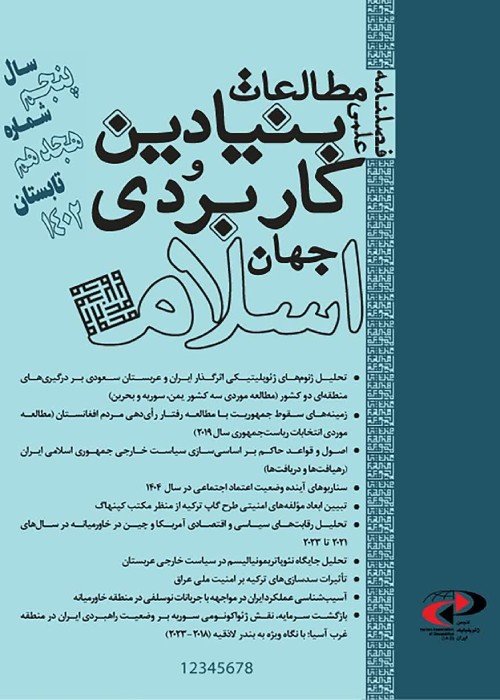Ranking of influential factors in geopolitical crises in the West Asian region
Beginning in the twentieth century and up to now, Islam has been viewed by both state and non-state actors as an increasingly important political force, whether in the sense of reinforcing alternative revolutionary models, rejecting current government rule, reforming social activities, women's rights, or reforming social rights, Phobia Islam (which is pursued by Western powers for the purpose of executing a strategy of disorder in the Islamic world as well as for creating panic in the public opinion of the world) in the form of kidnapping of foreigners, mistreatment of religious minorities or suicide bombings Is. While Islam has always endorsed politics as a clergyman, many writers have argued that in the twentieth century, the rise of Islam as a widespread political force to change, reform and even revolutionize the practice of responding to Westernization. Colonialism, the struggle for independence, as well as the establishment of a nation-state of our own have preceded the colonial period. The rooting of geopolitical crises requires investigating the historical course of crisis development and identifying factors influencing the occurrence of geopolitical crises, analyzing the role of governments and inter-regional political actors, recognizing the role of governments and interregional interfering actors, identifying and examining the role of religious, political and cultural elites, Is social. Summing up the views of the authors, it is believed that the crises of the Islamic world have at least two sources, both domestic and foreign. Thus, within the Muslim world and among Muslims, a complete lack of understanding of Islamic principles and teachings on the one hand and distortion of religion and instrumental use of religious concepts and principles by some intellectuals and power on the other hand lead to the creation of ideological beliefs and attitudes. There was a change in the Islamic world, and the Muslims became a sect and a group accordingly. This situation came to a critical point when dogmatism, self-centeredness among the followers of each sect was created and they considered themselves absolute rights and accused the followers of other groups of exaggeration. Over time, this ideological challenge was not only resolved but also intensified by the intervention of other actors, especially what is termed the "geopolitical competition of Islam and the West". There is also a divergence of opinion and religious-religious conflict not only among the Muslim people but also in the current conditions of the Muslim world, extending to political levels at the local, national, and regional scales. At the grassroots level, we see the clash of political groups and parties with ideological origins, and nationally, unfortunately, sectarian strife of religious and ethnic origin is mounting in the Muslim world, and at the most important level in terms of acting power, Muslim states and governments. These conflicts are at their highest levels, to the detriment of Muslim nations and nations, and to the benefit of non-Muslims. The present research was pursued to achieve the main objective of the research, which is to rank the influential components and indicators in the geopolitical crises of the Islamic world by using a mixed research method, a combination of two working methods. And verbal interviews with experts, study of the theoretical literature of research, interviews and obtaining point of view were done to explore the factors and then to describe the variables in order to identify the dimensions, components and related indicators in the model. Data analysis was done using Delphi method. Finally, the theoretical framework was elaborated and quantified (by designing a questionnaire and calculating the validity and reliability of data collection). Therefore, the research approach was mixed in terms of the type of data collected and in terms of development-purpose. Firstly, by using descriptive analysis, The collected data were summarized and categorized by descriptive statistics indices that were analyzed by mean, fashion, median, variance. Then, using inferential analysis method, correlation relations between components and indices were extracted and standardized by SPSS software. Finally, the researchers conclude that the Muslim world in the West Asian region is experiencing various geopolitical crises, such as the emergence of Takfiri groups, rivalry between neighboring countries, ideological rivalries, ethnic and cultural disruptions. Kurdish. In the short term, the crisis has caused the crisis of war, homelessness and the growth of terrorist currents, and will have far-reaching consequences in the long run, leading to the breakup and disintegration of Islamic countries into smaller and smaller areas and geopolitical changes in the West Asian region. Can be. The cause of these crises is the control, intervention and capture of one or more values such as location, space, location, water, resources, territory, ethnic minority, export market, freight route, energy, island, gorge, boundary line, religious location, and the like. It is. In the present study, after examining the factors affecting the ratings crisis, according to Friedman test, it was found that the political factor and the human factor have the highest rank in the crisis, respectively. And the economic, military and human factors are ranked between these two factors.
- حق عضویت دریافتی صرف حمایت از نشریات عضو و نگهداری، تکمیل و توسعه مگیران میشود.
- پرداخت حق اشتراک و دانلود مقالات اجازه بازنشر آن در سایر رسانههای چاپی و دیجیتال را به کاربر نمیدهد.



